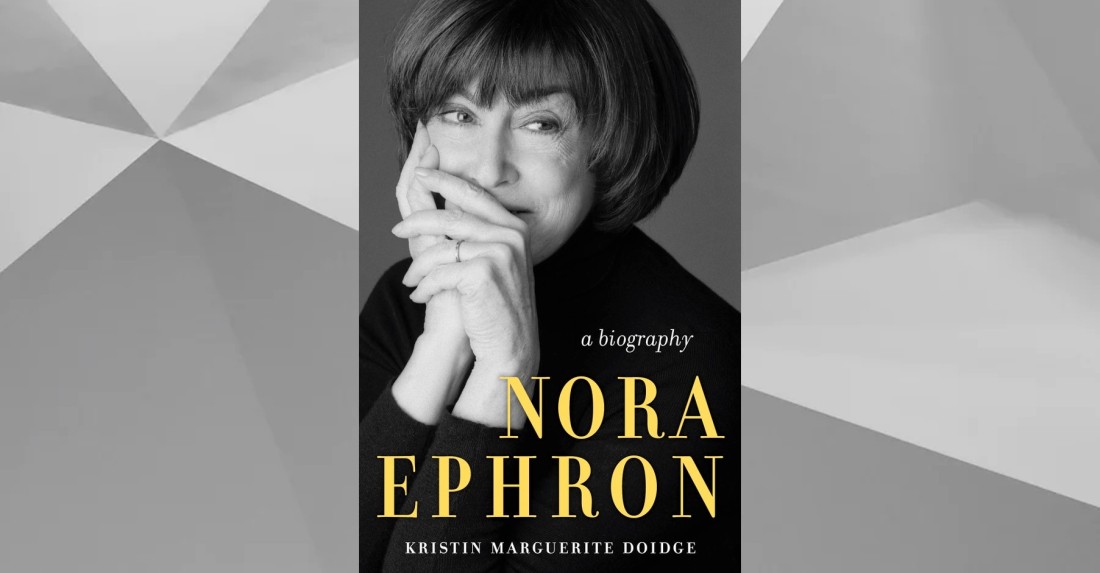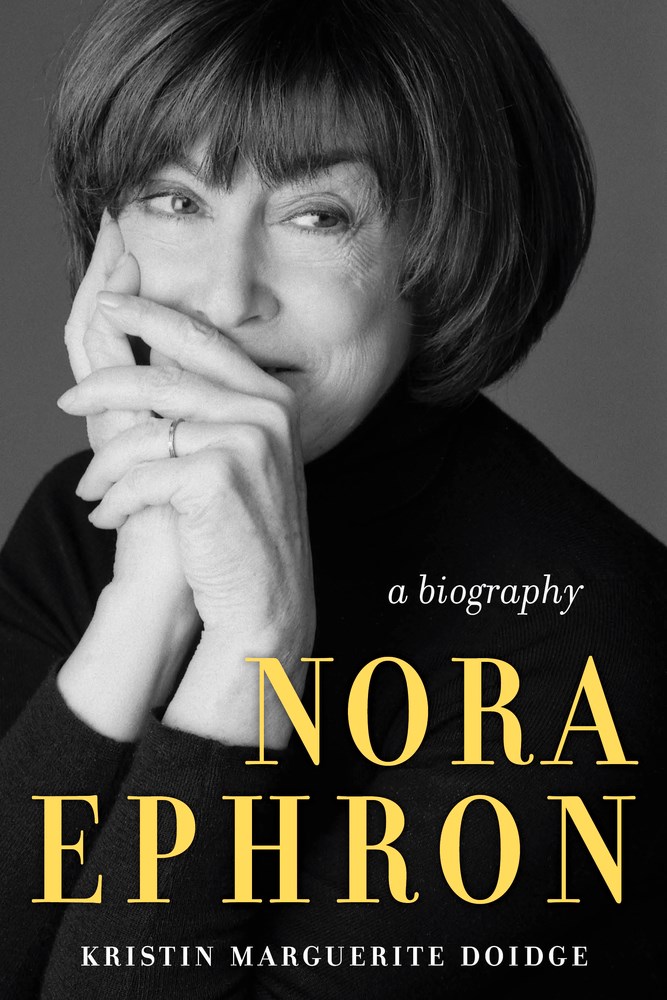“All roads lead to Nora,” Kristin Marguerite Doidge writes at the start of Nora Ephron: A Biography, and I can’t disagree. My road did. I was graduating from high school in 1989 when the rom-com, When Harry Met Sally, was released. I learned Ephron had written the screenplay. From there, I discovered her other work, particularly her essays. Her 2008 collection, I Feel Bad About My Neck: And Other Thoughts on Being a Woman, is still one of my favorites. I felt connected to her in other ways, too. She was the eldest of four sisters; I am the second of five. We were both born to literary parents. She loved Jane Austen and reread Pride and Prejudice every year. Same here. She was a feminist, an essayist, and a screenwriter: check, check, and check.
I was predisposed to like Doidge’s biography because of its subject, and I wasn’t disappointed. It’s highly accessible, uses both primary and secondary source material, and is alive with Ephron’s own voice and words throughout. It’s organized into five “acts” that move chronologically through Ephron’s life. It begins with her birth in 1941 and her “unconventional” childhood in New York and California, then chronicles her education at Wellesley, her long and varied career, the ups and downs of her personal life, and her too-early death from acute myeloid leukemia in 2012. The book concludes with book club questions, notes, and a selected bibliography.
By most accounts, Ephron was a remarkable woman. She was a journalist, an essayist, a screenwriter, and a film director in an age when women were more likely to be career housewives, and she didn’t know she wanted to direct until she was nearly fifty. According to one of her longtime friends and producers, Lynda Obst, she was the first person to write about women and their lives. She covered “women’s issues” in the early 1960s for New York Magazine and in the early 1970s for Esquire. She was an early practitioner of New Journalism, in which first person point-of-view and literary devices typically reserved for fiction were beginning to be used in news articles. (She thought the term “New Journalism” was a bit much, though, because “writing had always been personal to her.”)
During her fifty-year career, she wrote thirteen screenplays that were developed (three of which were nominated for Academy Awards), and she made nearly twenty films, including Sleepless in Seattle, You’ve Got Mail, Michael, and Julie & Julia. The story of Ephron’s life, however, is not about a woman who defied the odds stacked up against her and came out on top. Not really. The odds were already in her favor. She was born into a relatively well-to-do family helmed by two already successful and well-connected playwrights and screenwriters. Her childhood home was characterized by a “love of language and literature, and of vibrant conversation around a dinner table.” Her parents were devoted to “narrative and comedy,” according to Doidge. Her mother was ahead of her time and expected her daughters to have careers. Ephron herself was gifted with a strong voice and sense of humor, and she came of age when the women’s movement, which matched her sensibilities, was getting under way. In short, Ephron was planted in fertile ground. But she took full advantage of what she was given. She built on what her parents had created — made her own connections in the literary, film, and theatre communities — and sought opportunities to learn and grow.
And her life was not without hardship. Her parents were alcoholics. “Alcoholic parents are so confusing,” Ephron wrote. “They’re your parents, so you love them: but they’re drunks, so you hate them. But you love them. But you hate them.” And her second husband, investigative journalist Carl Bernstein of Woodward and Bernstein fame, betrayed her after the birth of their second son. But “everything is copy,” her mother used to say. You can “write your way out of any problem. You can even make it funny.” Ephron put this advice to good use. For instance, she wrote the novel Heartburn, a fictionalized version of her real-life marriage to and divorce from Bernstein, after his infidelity.
If there is a thesis to Doidge’s biography, it’s exactly this: Everything is copy. The veil between nonfiction and fiction is thin. If life is a story, then you are its heroine. Ephron can be your guide. She succeeded with resilience — authenticity, not sentimentality — and what I would characterize as an openness to experience.
What I am most grateful for, though, is that she never forgot the industry’s hesitation to support stories by and about women. “If I went to a studio with a script about a 32-year-old man with a hangnail, they’d make it,” she once quipped. Despite the struggles, she never stopped writing about women. Nora Ephron kicked the studio door open with the toe of her boot and marched through, keeping the door propped open for the rest of us.
NONFICTION
Nora Ephron: A Biography
By Kristin Marguerite Doidge
Chicago Review Press
Published June 7, 2022


